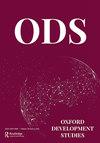Aye for the tiger: hegemony, authority, and volition in India’s regime of dispossession for conservation
IF 1.2
Q3 DEVELOPMENT STUDIES
引用次数: 5
Abstract
ABSTRACT Dispossession of rural populations to create inviolate Protected Areas for biodiversity conservation is a shared concern in BRICS countries. This article explores the distinctive ideology, institutions, and actors that constitute the regime of dispossession for conservation (DfC) in India’s tiger reserves. It investigates the reasons for the regime’s continued stability and resilience in the neoliberal era, when land-taking for industrial development has become highly contentious. India’s conservationist state has effectively denied resource rights to the inhabitants of Tiger Reserves and displaced them through its Voluntary Relocation Scheme, which is posited as a win-win solution for tigers and tribals. The historically unequal relationship between the state and forest dwellers necessitates closely examining hegemonic processes through which volition for relocation is assembled. This article argues that the Dispossession for Conservation regime assembles volition through a complex interplay of its hegemony and authority with the unfulfilled development aspirations of India’s forest dwellers.为老虎呐喊:霸权、权威和印度强占保护政权的意志
剥夺农村人口以建立不可侵犯的生物多样性保护保护区是金砖国家共同关注的问题。本文探讨了独特的意识形态、制度和行为者,这些意识形态、制度和行为者构成了印度老虎保护区的保护剥夺制度(DfC)。它调查了新自由主义时代政权持续稳定和恢复的原因,当时工业发展的土地征用已经成为高度争议。印度的自然资源保护主义者实际上剥夺了老虎保护区居民的资源权利,并通过自愿搬迁计划将他们转移,该计划被认为是老虎和部落的双赢解决方案。历史上,国家和森林居民之间的不平等关系要求我们仔细审视霸权进程,通过这些霸权进程,重新安置的意愿得以集结。本文认为,“为保护而剥夺土地”制度通过其霸权和权威与印度森林居民未实现的发展愿望的复杂相互作用,集合了意志。
本文章由计算机程序翻译,如有差异,请以英文原文为准。
求助全文
约1分钟内获得全文
求助全文
来源期刊

Oxford Development Studies
DEVELOPMENT STUDIES-
CiteScore
2.70
自引率
0.00%
发文量
20
期刊介绍:
Oxford Development Studies is a multidisciplinary academic journal aimed at the student, research and policy-making community, which provides a forum for rigorous and critical analysis of conventional theories and policy issues in all aspects of development, and aims to contribute to new approaches. It covers a number of disciplines related to development, including economics, history, politics, anthropology and sociology, and will publish quantitative papers as well as surveys of literature.
 求助内容:
求助内容: 应助结果提醒方式:
应助结果提醒方式:


